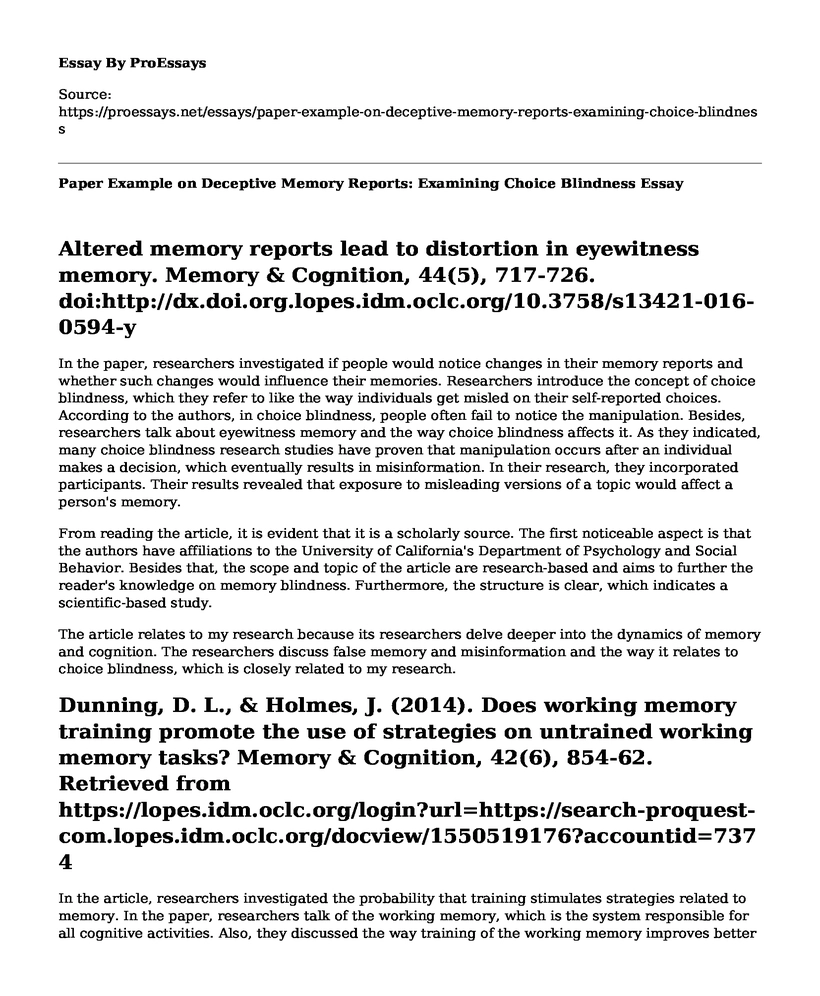Altered memory reports lead to distortion in eyewitness memory. Memory & Cognition, 44(5), 717-726. doi:http://dx.doi.org.lopes.idm.oclc.org/10.3758/s13421-016-0594-y
In the paper, researchers investigated if people would notice changes in their memory reports and whether such changes would influence their memories. Researchers introduce the concept of choice blindness, which they refer to like the way individuals get misled on their self-reported choices. According to the authors, in choice blindness, people often fail to notice the manipulation. Besides, researchers talk about eyewitness memory and the way choice blindness affects it. As they indicated, many choice blindness research studies have proven that manipulation occurs after an individual makes a decision, which eventually results in misinformation. In their research, they incorporated participants. Their results revealed that exposure to misleading versions of a topic would affect a person's memory.
From reading the article, it is evident that it is a scholarly source. The first noticeable aspect is that the authors have affiliations to the University of California's Department of Psychology and Social Behavior. Besides that, the scope and topic of the article are research-based and aims to further the reader's knowledge on memory blindness. Furthermore, the structure is clear, which indicates a scientific-based study.
The article relates to my research because its researchers delve deeper into the dynamics of memory and cognition. The researchers discuss false memory and misinformation and the way it relates to choice blindness, which is closely related to my research.
Dunning, D. L., & Holmes, J. (2014). Does working memory training promote the use of strategies on untrained working memory tasks? Memory & Cognition, 42(6), 854-62. Retrieved from https://lopes.idm.oclc.org/login?url=https://search-proquest-com.lopes.idm.oclc.org/docview/1550519176?accountid=7374
In the article, researchers investigated the probability that training stimulates strategies related to memory. In the paper, researchers talk of the working memory, which is the system responsible for all cognitive activities. Also, they discussed the way training of the working memory improves better recall and storage of information. According to them, training of the working memory introduces essential changes to the brain. During the study, researchers performed a randomized controlled trial where participants indulged in working memory tests prior to getting working memory training, non-adaptive working memory training with loads, or no training. Based on their results, when the working memory receives training, people can recall various memory tasks.
The paper is a scholarly source for a myriad of reasons. First, the authors are affiliated to the MRC Cognition and Brain Sciences Unit. Besides that, the content presented in the paper is research-based and analytical as it furthers a reader's understanding of working memory and how it works. Also, the language and structure used in the article are clear and technical respectively.
The article relates to my research since it talks of the brain and the working memory. The discussion on trained and untrained working memory furthers my comprehension on the topic of the manner in which the brain works.
What makes me? Part 2: The brain with David Eagleman [Video file]. (2015). Retrieved May 6, 2019, from https://digital.films.com/PortalPlaylists.aspx?wID=96349&xtid=114669
This episode of The Brain with David Eagleman investigates the topic of how the brain role is to deal with thoughts, feelings, our recollections, and identity. Dr. David Eagleman explained that to a neuroscientist. As per him, the process of becoming a human being starts during childbirth. He clarified that the human brain begins life incomplete. He included that the way toward turning into a completely created human takes quite a while, and the brain does not quit producing new associations when we become grown-ups. He declared that as we gain new experiences, adapt to new abilities, and have educational encounters the mind is continually and powerfully reworking itself. Additionally, he showed that the brain never stops.
The video from pbs is scholarly because the video by Dr. David Eagleman is objective. The video is quality in nature because it explains a scientific topic. Besides that, Dr. David Eagleman has affiliations to the school of neuroscience.
The video relates to my research because that particular episode, what makes us, discusses the brain and its functions including memory. Dr. Eagleman sets out a pace for readers to comprehend the role of the brain and the way it functions in human beings from childhood to adulthood.
Cite this page
Paper Example on Deceptive Memory Reports: Examining Choice Blindness. (2023, Jan 11). Retrieved from https://proessays.net/essays/paper-example-on-deceptive-memory-reports-examining-choice-blindness
If you are the original author of this essay and no longer wish to have it published on the ProEssays website, please click below to request its removal:
- Understanding and Controlling Teenage Suicide
- Literacy Narrative Essay Example
- From West Africa to the US: Essay Sample on A Self-Analysis Journey of Life
- Essay Example on Music and Memory: A Biological Connection
- Essay Sample on Inclusion of Exceptional Children: Ensuring Support and Development
- Essay Example on Global Crisis: The Unending Battle Against Disease
- My life of Reading - Free Essay Example







